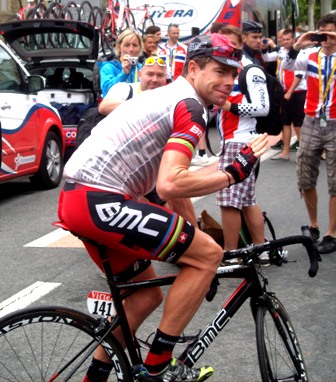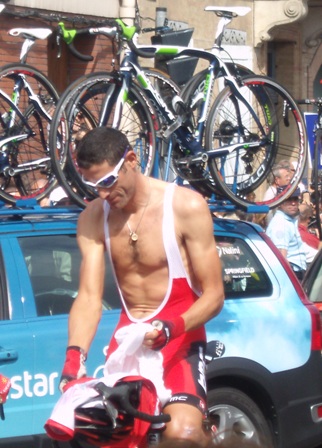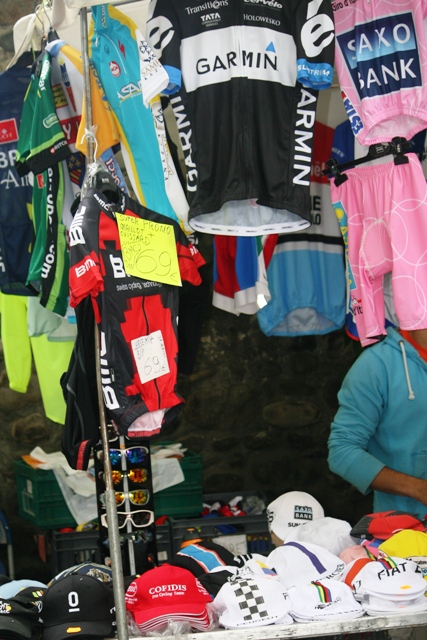
Cadel Evans: picked out as TLR's favourite as early as week one
Lost in France: encore et encore et encore
To celebrate the completion of four years in virtual print The Leisure Review sent a team of correspondents – les envois speciales – to France to sample the sport, leisure and cultural highlights of our nearest neighbours.

Cadel Evans: picked out as TLR's favourite as early as week one
Next time you are faced with an eighteen-hour car journey and you want to wile away a few miles try to select the top five of sport’s equivalent to a World Heritage site. The final of the World Series of baseball? Very parochial. Wimbledon? Certainly an important occasion for anyone who loves tennis but how many of us do? Soccer’s World Cup final? Not after the last one, which was a bad advertisement for humanity itself, let alone the large proportion of it that follows the soi-disant beautiful game. The Olympics? Perhaps, but even the final rounds of the Greco-Roman wrestling, let alone the preliminaries, were a hard sell for the marketeers this time around and the Atlanta Games were simply tawdry from the moment they were allocated to the end of the closing ceremony.
Designated World Heritage sites have history, world renown, a certain splendour and tend to be on a massive scale. Which of sport’s footling golf, rugby or volleyball events have the scale and majesty of the Great Wall of China or the sense of history of Stonehenge? Very few make the grade and only two stand out: the final of the Olympic men’s 100 metres and the Tour de France.
For three weeks the world watches as 198 cyclists in 22 teams race over 21 stages with the winner likely to be in the saddle for nearly 100 hours. Each year the organisers announce a different route, a route drawn as much by commercial manipulation and municipal pride as it is by its own long history and their own Machiavellian sense of what is right. Mark Cavendish winning five stages in one Tour, as he did last year, is not right; it is out of balance, it is predictable, it is undemocratic. This year, therefore, we have seen a series of uphill finishes, which have mitigated the power of the pure sprinters and brought slightly different athletes, one-day specialists of the likes of Phillip Gilbert, to the fore. That Cavendish is British and Gilbert hails from Belgium, home of the great Eddy Merckx, hot bed of cycling and a near neighbour, will never have entered race director Christian Prudhomme’s head; jamais.
The race for the maillot jaune – the yellow jersey – of race leader, both day-by-day as well as on the finishing podium, occupies the minds of television experts, bar room pundits, newspaper sport editors and even the girls who read the traffic on local French radio stations for all 22 of the days over which the race is contested and beyond. Increasingly, with the help of Channel 4, Sunset + Vine and now ITV4, even the English have started to love le grand boucle and with Cavendish, Bradley Wiggins and, in the last two years, the Team Sky juggernaut providing something to support, something to be parochially proud of, Le Tour has become for many a post-Wimbledon sporting staple.
It has become the fashion in sports development to find justifications other than the joy of sport to promote both grassroots participation and showpiece international events. One of the easier justifications to make for Le Tour, and the one which saw the cities of both Leeds and Edinburgh sniffing around this year’s Grand Depart in the Vendee, is tourism. The Tour draws a crowd.
This year that crowd was swelled by a team of three from The Leisure Review eager to investigate not just the race but the nation that hosts it. Are the French really aloof, unhygienic and unaware of the basics of road safety? Is the Tour over-hyped? And what price a bottle of beer and a ham sandwich outside the average village café?
The key question, of course, is why despatch three staffers to cover what actually amounted to one day’s racing? There are two answers. For Le Tour, everything must be bigger, better, more specialised; ask Mr Brailsford. And on top of that, no individual within the team had a working knowledge of the French language; an eloquent commentary on the state of the British school system.
The team (or l’equipe as they chose to call themselves) comprised: a chief correspondent (53), grammar school educated, content to speak a grammatically approximate version of French but only in the present tense, who struggles to understand everyday French; a camerawoman (45), secondary modern educated, with a nice line in secretarial French who understands it better than she speaks it; and a feature writer (as long as the feature belongs to Luxemburger and yellow jersey contender Andy Schleck) (21), local comprehensive educated, happy to point and say “Je voudrais” in every circumstance.
Language skills of this calibre coupled with another culture’s approach to road furniture compromised the team’s navigational skills on a number of occasions, although the actual process of driving on French roads was less problematic than feared, mainly because French drivers are relatively courteous. There is less sounding of horns than advertised, fewer cars on the roads in general than in England and, should their attitude to overtaking occasion the odd startle, it is simply that they have a more heightened sense of what is possible in a small space at speed than their English counterparts. They also abjure rules and will break them if it suits.
So it was that, when the gendarme guarding the main road into Cugnaux for the depart of stage 12 directed traffic to a park-and-ride some distance away and a stream of vehicles took the first right into a suburban street some 400 metres further on in an attempt to navigate an alternative route to the centre of town, your correspondents were with them, with a Gallic shrug thrown in for good measure.
Cugnaux is a small town on the outskirts of Toulouse notable only for it being close to the rugby town of Colomiers. Although nothing special, it was, however, en fête for its morning in the sun which, as luck would have it, was 14 July. The French celebrate the fall of the Bastille as assiduously as the English approach a royal wedding; everyone has the day off, everybody takes a small libation and some people take it all very seriously. Suffice it to say that for a Frenchman to be in yellow on the morning of the quatorze juillet is a matter of great delight and this year, courtesy of a major crash in the peloton and some complicated on-road politics, the leader of the Europcar team, Thomas Voeckler, had the maillot jaune on his shoulders. Europcar is a French team. Each of its riders is French (in contrast, the first British team to win a tour stage since 1948, Team Sky, numbers riders from six nations including stage winner Edvald Boasson Hagen from Norway) and the French were like chats which had got la crème.
As if a French man from a French team in the yellow jersey and with a chance to stay there was not exciting enough for the holiday crowds, this was also to be the first of the mountain stages, crossing the Col du Tourmalet before finishing at the ski resort of Luz-Ardiden, both names of Tour legend. Standing four and five deep against the railings set up either side of Cugnaux’s main street, the onlookers – aficionado and day-tripper, local and international visitor – were decorously febrile as the riders left their palatial tour busses, mounted their titanium steeds and headed down to the signing-in stage and the ceremonial start. Every French rider was cheered lustily. Every member of the Europcar team was hailed. When former champion Jacques Anquetil wandered by – on foot – he could have been the Pope. And into this polite maelstrom came the yellow jersey.
While almost every other rider tried to maintain their focus, Voeckler did interviews, posed for pictures and even stopped for a chat with the woman who runs the Miss France beauty pageant, a celebrity of note it seems. Whether he was following orders or just taking his chances in the spotlight was not clear but the crowd loved him for it.
All too soon the riders were waved off and the thousands of onlookers headed off to enjoy the rest of their 14th Juillet, having first watched the team cars, the medical support vehicles, the broadcasters’ vans and even the mighty team busses roll out of town. For a brief period local bars were full of chattering visitors debriefing on their brush with the magic of Le Tour but all too soon Cugnaux’s great day wound down and thoughts turned to the mountains of the Pyrenees and the important matter of lunch.
As to our questions: the price of a beer and a sandwich on race day in Cugnaux was six euros fifty and the French are a very sanitary nation who wash their hands assiduously after using the toilet and keep their washrooms clean. Occasionally women use the men’s facilities and sometimes there is only one such. Indeed, the junior staffer is still getting over the experience of sharing a toilet with a well-endowed paysan but that’s just part of France’s rich cultural tapestry. Finally, Le Tour is hyped right up to its occasionally drug-crazed eyeballs; but from the manic caravan publicitaire to the madcap bunch sprints and insanely hard mountain-top finishes it delivers. As much as the Canal du Midi and the medieval La Cite de Carcasonne – both World Heritage sites – Le Tour is a very French, bolted-on, undeniable wonder of the world
The Leisure Review, August 2011
© Copyright of all material on this site is retained by The Leisure Review or the individual contributors where stated. Contact The Leisure Review for details.
Download a pdf version of this article for printing

TLR captures the bikes but George Hincapie gets in the way
 :
:
The Tour tifosi's requirements: all manner of tat